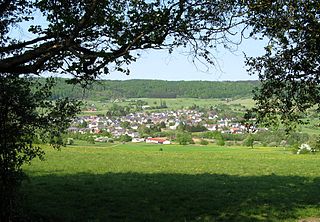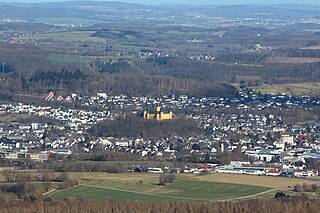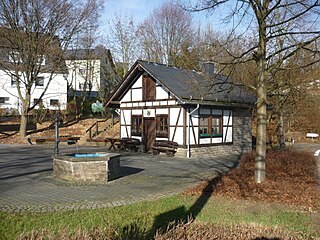
The Electoral Palatinate or the Palatinate, officially the Electorate of the Palatinate, was a constituent state of the Holy Roman Empire. The electorate had its origins under the rulership of the Counts Palatine of Lotharingia in 915; it was then restructured under the Counts Palatine of the Rhine in 1085. From 1214 until the Electoral Palatinate was merged into the Kingdom of Bavaria in 1805, the House of Wittelsbach provided the Counts Palatine or Electors. These counts palatine of the Rhine would serve as prince-electors from "time immemorial", and were noted as such in a papal letter of 1261; they were confirmed as electors by the Golden Bull of 1356.

The Westerwald is a low mountain range on the right bank of the river Rhine in the German federal states of Rhineland-Palatinate, Hesse and North Rhine-Westphalia. It is a part of the Rhenish Massif. Its highest elevation, at 657 m above sea level, is the Fuchskaute in the High Westerwald.

Neuwied is a town in the north of the German state of Rhineland-Palatinate, capital of the District of Neuwied. Neuwied lies on the east bank of the Rhine, 12 km northwest of Koblenz, on the railway from Frankfurt am Main to Cologne. The town has 13 suburban administrative districts: Heimbach-Weis, Gladbach, Engers, Oberbieber, Niederbieber, Torney, Segendorf, Altwied, Block, Irlich, Feldkirchen, Heddesdorf and Rodenbach. The largest is Heimbach-Weis, with approximately 8000 inhabitants.

The County of Isenburg was a region of Germany located in southern present-day Hesse, located in territories north and south of Frankfurt. The states of Isenburg emerged from the Niederlahngau, which partitioned in 1137 into Isenburg-Isenburg and Isenburg-Limburg-Covern. These countships were partitioned between themselves many times over the next 700 years.
Nieder-Isenburg was a small mediaeval county in northern Rhineland-Palatinate, Germany. It was located to the east of the town of Neuwied, due north of Vallendar.

Montabaur is a town and the district seat of the Westerwaldkreis in Rhineland-Palatinate, Germany. At the same time, it is also the administrative centre of the Verbandsgemeinde of Montabaur – a kind of collective municipality – to which 24 other communities belong. The town is known throughout the country for its strikingly yellow castle and its InterCityExpress railway station on the Cologne-Frankfurt high-speed rail line.
Isenburg-Grenzau was the name of several states of the Holy Roman Empire, seated in the Lordship of Grenzau, in modern Rhineland-Palatinate, Germany. The first state called Isenburg-Grenzau existed 1158–1290; the second 1341–1439; and the third 1502–1664.

Kurtscheid is a municipality in the district of Neuwied, in northern Rhineland-Palatinate, Germany. The village is located in the natural preserve Rhein-Westerwald. Kurtscheid is 401 metres above sea level and is hence the highest municipality in the district of Neuwied.

Winkelbach is an Ortsgemeinde – a community belonging to a Verbandsgemeinde – in the Westerwaldkreis in Rhineland-Palatinate, Germany.

Wied is an Ortsgemeinde – a community belonging to a Verbandsgemeinde – in the Westerwaldkreis in Rhineland-Palatinate, Germany.

Steinebach an der Wied is an Ortsgemeinde – a community belonging to a Verbandsgemeinde – in the Westerwaldkreis in Rhineland-Palatinate, Germany.

The County of Virneburg was a territory of the Holy Roman Empire in the region of the Eifel in present-day Rhineland-Palatinate.
Rupprecht of the Palatinate or Ruprecht of the Palatinate may refer to:
Electoral Palace or Elector's Palace may refer to any of the palaces of one of the German Holy Roman Empire's Prince-electors:
An imperial election was held in Cologne on 5 January 1531 to select the King of the Romans of the Holy Roman Empire. As the current emperor, Charles V, had not yet died nor abdicated, this election was conducted so as to determine his successor.
This page is based on this
Wikipedia article Text is available under the
CC BY-SA 4.0 license; additional terms may apply.
Images, videos and audio are available under their respective licenses.









